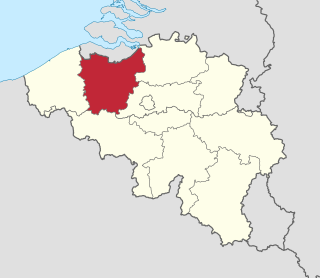
East Flanders is a province of Belgium. It borders the Dutch province of Zeeland and the Flemish province of Antwerp, Flemish Brabant, Hainaut and West Flanders. It has an area of 3,007 km2 (1,161 sq mi), divided into six administrative districts containing 60 municipalities, and a population of 1,515,064 as of January 2019. The capital is Ghent, home to the Ghent University and the Port of Ghent.
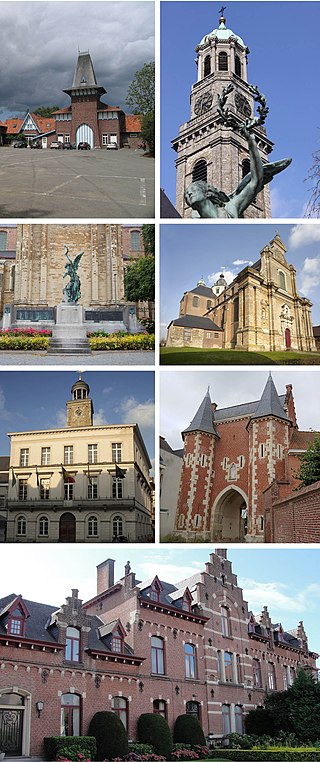
Ninove is a city and municipality in the Flemish province of East Flanders in Belgium. It is on the river Dender, and is part of the Denderstreek. The municipality comprises the city of Ninove proper and since the 1976 merger of the towns of Appelterre-Eichem, Aspelare, Denderwindeke, Lieferinge, Meerbeke, Nederhasselt, Neigem, Okegem, Outer, Pollare and Voorde. On 1 January 2023 Ninove had a total population of 40.090. The total area is 72.57 km2 which gives a population density of 553 inhabitants per km2.

The Open Flemish Liberals and Democrats is a Flemish conservative liberal political party in Belgium. A smaller fraction within the party has social liberal views.
Vooruit is a Flemish social democratic political party in Belgium. It was known as the (Flemish) Socialist Party until 21 March 2021, when its current name was adopted.

Vivant is a small social-liberal political party in Belgium founded by millionaire Roland Duchâtelet. In the regional elections in June 2004, the party formed a strategic alliance with the Flemish Liberals and Democrats (VLD). Both parties are founded on the principle of individualism and can be called liberal. In 2007, the party announced it would likely merge with the VLD.

Hugo F.V. Coveliers is a retired Belgian politician and lawyer. He was a member of the Belgian Chamber of People's Representatives between 1985 and 1995, and from 1993 to 2003. Since 2003, he has been a member of the Belgian Senate. He was a parliamentary chairman for the VLD in both chambers, from 1999 to 2003.
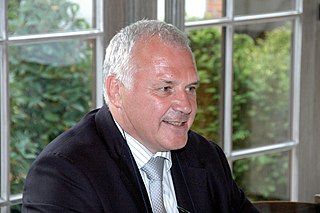
Jean-Marie Louis Dedecker is a Belgian politician.
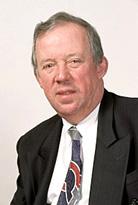
Eduard Marie August "Ward" Beysen was a Belgian politician and well-known freemason. He held a degree in Dutch and history teaching, obtained in 1963, in Lier and started his political career in the seventies in the Flemish liberal party, the Party for Freedom and Progress (PVV), which was renamed Flemish Liberals and Democrats (VLD) in 1992. Ward Beysen – suffering a depression – died by drowning himself in the lake of Fort 6 in the south of Antwerp.

The Federal Government of Belgium exercises executive power in the Kingdom of Belgium. It consists of ministers and secretary of state drawn from the political parties which form the governing coalition. The federal government is led by the prime minister of Belgium, and ministers lead ministries of the government. Ministers together form the Council of Ministers, which is the supreme executive organ of the government.

The Flemish Government is the executive branch of the Flemish Community and the Flemish Region of Belgium. It consists of a government cabinet, headed by the Minister-President and accountable to the Flemish Parliament, and the public administration divided into 13 policy areas, each with an executive department and multiple agencies.
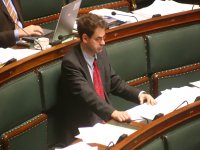
Alfons "Fons" Borginon is a Belgian politician and lawyer. He was a member of the Belgian Chamber of Representatives between 1995 and 2007. Borginon was the last chairman of the Volksunie and Flemish Liberals and Democrats (VLD) floor leader from 2006 until the general election of 2007. He was also granted knighthood in the Belgian Order of Leopold. He is married to Kristin Ex and father of Hendrik, Irene and Margreet.

Laurette A. J. Onkelinx is a Belgian politician from the Francophone Socialist Party. She was the Deputy Prime Minister – Minister of Social Affairs and Public Health in the Belgian federal government, i.e., the Di Rupo Government, which took office on 6 December 2011.
Nova Civitas was a Flemish think tank based on the principles of classic liberalism in combination with Anglo-Saxon conservatism. Nova Civitas claimed at its founding to be completely independent, although it was recognized and supported by the Flemish Liberal Party (VLD). The Founding Chairman of Nova Civitas, Boudewijn Bouckaert, was a long-time board member of the VLD.
According to their website, the basic principles of Nova Civitas were:

The Liberal Appeal was a Flemish conservative-liberal political party.

The Dutch-speaking electoral college is one of three constituencies of the European Parliament in Belgium. It currently elects 12 MEPs using the D'Hondt method of party-list proportional representation. Previously it elected 13 MEPS, until the 2013 accession of Croatia. Before that, it elected 14 MEPs, until the 2007 accession of Bulgaria and Romania.

Federal elections were held in Belgium on 10 June 2007. Voters went to the polls in order to elect new members for the Chamber of Representatives and Senate.

Petrus Josephus Jacobus "Jaak" Gabriëls is a Belgian politician and member of the Flemish Liberals and Democrats (VLD). He graduated in 1965 at the Catholic University of Leuven as Master of Philosophy and Arts. He started his political career as a Provincial Councillor for Limburg from 1974 to 1977. From 1977 till the last day of December 2012 he was the Mayor of Bree, and from 1977 he was Member of the Chamber of Representatives. From 1995 to 1999 he was a Member of the Flemish Parliament.

Libertarian, Direct, Democratic is a conservative-liberal, libertarian, right-wing populist Flemish political party in Belgium.
The 2007–2008 Belgian government formation followed the general election of 10 June 2007, and comprised a period of negotiation in which the Flemish parties Flemish Liberal Democratic, Christian Democratic and Flemish (CD&V) and New Flemish Alliance (N-VA), and the French-speaking parties Reformist Movement (MR), Democratic Front of Francophones (FDF) and Humanist Democratic Centre (CdH) negotiated to form a government coalition. The negotiations were characterized by the disagreement between the Dutch- and French-speaking parties about the need for and nature of a constitutional reform. According to some, this political conflict could have led to a partition of Belgium.

The Verhofstadt II Government was the federal government of Belgium from 12 July 2003 to 21 December 2007.















